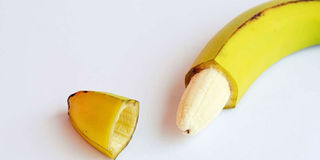Doc, when can I go back to work after circumcision?

It takes between two and three weeks for an adult to recover from circumcision. PHOTO | FOTOSEARCH
Dr Flo,
I am 37 years old and I’m not circumcised. I really want to undergo the operation. How long will it take to heal after the surgery, because I can only get a few days to two weeks off from work?
S O
Dear S O,
It takes between two and three weeks for an adult to recover from circumcision. During that time, you’ll need to keep the dressings on the wound clean and you can use an ice pack to reduce swelling. You will be given painkillers, and antibiotics to prevent infection. Without complications, most people can resume normal physical activity and exercise after four weeks, and sexual activity after six weeks.
Dr Flo,
My daughter, who is six-and-a-half years old nosebleeds about twice a week. I’ve not taken her to hospital yet. What could be the cause of her nosebleeds and the effects?
Felix
Dear Felix,
Nosebleeds are common and about 60 per cent of people will experience at least one at some point in their life. The nose has many blood vessels close to the surface, covered by a thin lining, which makes it easier for it to bleed than other body parts. Most times, a nosebleed is not a cause of concern and can be easily stopped by bending forward and pinching the soft part of the nose. If the bleeds are frequent and/or heavy, then an ENT review is advisable.
Those who are at a higher risk of nosebleeds are those with bleeding disorders or those taking blood thinning medication. Children between two and 10 years are also more likely to nose bleed because of frequent colds, allergies, nose picking and sticking things into their noses. Nasal polyps (growths in the nose) and a deviated septum (the wall that separates the two sides of the nose) also make one susceptible to nose bleeds. Repeated use of nasal sprays, exposure to irritants (for example chemicals and strong odours) and high altitude can also trigger nosebleeds.
A mild nosebleed usually is not a health concern. Prolonged or heavy blood loss can lead to anaemia or haemorrhagic shock, so if the bleeding doesn’t stop after 20 minutes of applying pressure or if it is heavy, please see a doctor. Since in your daughter’s case the nosebleeds have been recurrent, it is advisable to visit an ENT specialist. At home, please keep her nails short, advise her not to pick her nose or insert anything into the nose and not to blow her nose very hard. Teach her to sneeze with the mouth open, into a handkerchief. Using saline nasal drops daily to keep the lining moist may also help.
Dr Flo,
I'm 22 years old and I experience premature ejaculation. Sometimes I have a weak erection, which makes penetration hard during sex. Please help.
Zak
Dear Zak,
The normal male sexual response cycle involves desire, arousal, plateau, ejaculation, and resolution. The average time from beginning of intercourse to ejaculation is five minutes. This is an average, so there are people who take a shorter time and some who take longer, sometimes depending on the particular situation. If ejaculation happens sooner than you or your partner would like, it is called premature ejaculation. If it happens once in a while, then it is not a cause of concern. If it is frequent and is causing frustration, then it needs to be addressed.
It can occur due to psychological and physical factors. Psychological issues include traumatic early sexual experiences, worry about sexual performance, anxiety, depression, guilt, poor self-image or relationship problems. Physical factors include abnormal levels of hormones or brain messengers (neurotransmitters) or inflammation of the urethra or the prostate.
Having a problem with achieving an erection once in a while is not a cause of concern. You may have low libido, which means there is a decrease in desire for sexual activity, which can lead to a problem with achieving an erection. If it persists, it may be due to psychological issues caused by excessive masturbation or relationship issues, performance anxiety, stress, anxiety, depression among others. You may also have a physical problem that is affecting the quality of your erections such as obesity, alcoholism, smoking or other drugs, reduced testosterone levels among others.
To manage this, any psychological issues need to be addressed, if necessary, by visiting a mental health professional. You also need to have a supportive partner. There are medications that can be prescribed and topical creams that can be used that have a numbing agent.
Other ways of managing it include: Avoiding sexual intercourse for some time and focusing on other forms of touch to reduce the pressure to perform.
Strengthen the pelvic muscles using kegel’s exercises — tighten the muscles that you would use to stop urine flow. Contract these muscles 10 times and repeat at least three times a day.
Stop-start technique — during intercourse, when you feel the urge to ejaculate, stop all activity until the urge passes, then start again. By repeating as necessary and some practice, holding off ejaculation can become a habit.
Pause and squeeze technique — during intercourse, when you are about to ejaculate, have your partner squeeze the penis where the head joins the shaft for several seconds, until the urge passes, then continue.
Using a condom to reduce sensitivity.
Send your medical questions to [email protected] for free expert advice.


